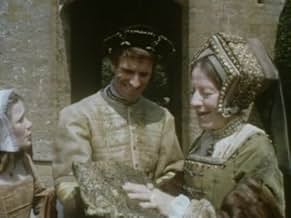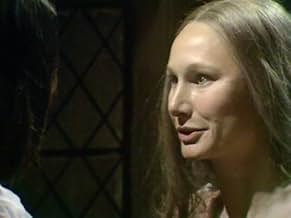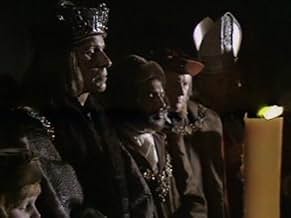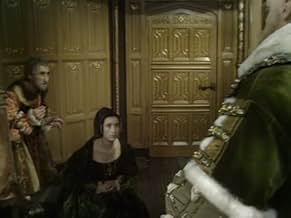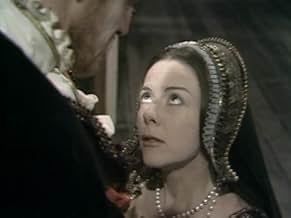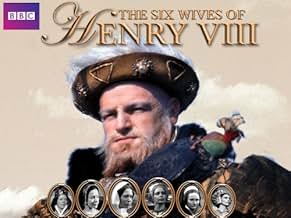IMDb-BEWERTUNG
8,4/10
1522
IHRE BEWERTUNG
Füge eine Handlung in deiner Sprache hinzuA six-episode dramatization of Henry VIII's relationships with each of his six wives. Each episode is devoted to one wife, and is a complete play in itself.A six-episode dramatization of Henry VIII's relationships with each of his six wives. Each episode is devoted to one wife, and is a complete play in itself.A six-episode dramatization of Henry VIII's relationships with each of his six wives. Each episode is devoted to one wife, and is a complete play in itself.
- 1 Primetime Emmy gewonnen
- 7 Gewinne & 8 Nominierungen insgesamt
Folgen durchsuchen
Empfohlene Bewertungen
The best TV miniseries I've ever seen by far. Originally a BBC presentation, it became something of a pop culture phenomenon here in the summer of 1971, when, edited and with a more elegant introduction, it was presented on six Sunday nights. What's best in it is what's most important- the characterization by the six different playwrights of that monstrous old charmer, Henry VIII, and the performance(s) of Keith Michell in the role. I'll give my comments wife by wife. (The title of each episode is the name of the wife.)
CATHERINE OF ARAGON (A) The proximate cause of the English Reformation, the daughter of Ferdinand and Isabella of Spain who had been briefly married to Henry's older brother, whom he married with the necessary papal dispensation, and later wanted to dump because she didn't produce a male heir, which led to all the trouble with Rome. The series gets off to a rocky start. It was a daring ploy of the author to be deliberately tedious in the depiction of the unnoteworthy trials of the young "princess dowager" so as to draw a sharp ironic parallel to the world-shaking trials of the OLD "princess dowager." The satisfaction you feel in getting the point makes up for your initial impatience. All of the wives give fine performances; Annette Crosbie's is one of two which are as great as Michell's. She does full justice to a very great lady. Complaints: her old-age make-up is way overdone (she looks 60-70 instead of 40-50)and this is the only episode compromised by a gratingly poor performance (you'll know whom I mean).
ANNE BOLEYN (A-) Interestingly, the one part of Henry's life which is well-known, his romance with Anne Boleyn, is dispatched here in a minute-long opening interlude. There are some serious weaknesses in the script. The phraseology is "off" a lot- too modern, too soap operatic. ("Love is a most Complete Experience...") It puts its emotional climax (Anne's trial for adultery) at the mid point and then has to trump up unlikely, pointless scenes between the doomed Queen and the Henry's weak yes-man Archbishop Cranmer which come off as actors stalling on a stage because the hands are having trouble wheeling out the block. Henry is reduced to a supporting role in this one and is purely the villain of the piece. The previous Catherine and this Anne are the only wives whose personalities and words have come through in the pages of history; what's most admirable here (and least soap operatic) is that neither the playwright nor the actress (the late Dorothy Tutin)try to gloss over the cruelty and arrogance of the legendary Hussy, and even seem to want to convey the idea that in a sense getting thrown in the Tower and having her head chopped off were the best things that ever happened to her, almost a blessed relief. The supporting players are generally superb in all episodes. Here Anne's brother George and the gentle coward Cranmer are stand-outs.
JANE SEYMOUR (A+) Television at its finest. All but sheer perfection in every way. By far the richest in drama and historical analysis. The playwright ingeniously parlays the little that is known about the sweet country girl (the original Plain Jane)who gave Henry his all-important prince and then quietly crept into her tomb, into an unforgettably touching look at Innocence and Goodness defiled and destroyed even as it's healing and helping (to some degree) Guilt and Badness. The psychological and moral depth matches the emotional- a rare triumph. The portrait it draws of Henry is the most balanced, and Anne Stallybrass is the other actress who attains magnificence. Okay, one tiny flaw: the merry-making scenes are too long.
ANNE OF CLEVES (A-) In the series as in life, a little comedy relief in Henry's ghastly marital career. Elvi Hale is a delight as the supposedly ungainly German princess whom the now grotesque and dilapidated Henry married to deal an alliance with the European Protestants. All that's known of the real Anne is that she was considered ugly and gauche but loved even by Henry (after dumping her in short order) for her simple good nature. Here the "joke" is that behind the scenes Anne is a brilliant political chess player who only plays dumb when expedient. But the good nature is still there, along with a rather anachronistic conviction that "comforting a hurt child is more important than squabbles between Churches", making her probably the only one of the six wives most modern people could like and identify with. Biggest problem: the "informational dialogue" is poured on too thick. The fact that Miss Hale is not just not ugly but actually the only wife who comes close to being beautiful, may be part of the "joke": we have portraits of all six real life wives and she, the "ugly" one, is generally thought to be the only pretty one. The simple sadness of the last shot is unforgettable.
CATHERINE HOWARD (A-) Michell shines as the wreck of his dashing and heroic former self trying to drum up a second wind in his blubbery old hulk when he falls head over heels for a pretty lass whom he makes Queen of England without checking her references... The real Catherine was just a vain and frivolous little ninny who led a sordid life and came to a bad end: to tease a Legend out of this pitiful footnote here Catherine has all the cunning and craft and steely will of Cleopatra and Scarlett O'Hara, and all the rhetorical grandeur of Antigone. The artifice doesn't quite jibe with the facts even as shown. Angela Pleasance is excellent as the witchy little wanton; appropriately, she's attractively nubile but on closer look really not even that pretty. It's a detail which nicely highlights the Die Young/Stay Young Eternally theme. Compelling, but a little too nasty for its own good. The scene in which Catherine banishes the court jester is a nice touch (the clown as sinister symbol of Fate).
CATHERINE PARR (A)The most plodding of the scripts, the least thematically engaging and most history bookish and episodic, so it's a good thing that the dialogue is especially witty and incisive. Another great lady among the six wives in real life, and Rosalie Crutchley does a fine job of projecting her intelligence, humor, kindliness, and honesty, as well as her mortal terror when despite all her golden virtues she almost goes the way of the first Anne and the next-to-last Catherine because of her one fault: she doesn't know when to keep her mouth shut on the subject of Religion in earshot of a husband who made up his own religion up as he went along and had a habit of killing those who wouldn't or couldn't keep up with the developments. Scene of King and Kate's first meeting one of best in the series.
CATHERINE OF ARAGON (A) The proximate cause of the English Reformation, the daughter of Ferdinand and Isabella of Spain who had been briefly married to Henry's older brother, whom he married with the necessary papal dispensation, and later wanted to dump because she didn't produce a male heir, which led to all the trouble with Rome. The series gets off to a rocky start. It was a daring ploy of the author to be deliberately tedious in the depiction of the unnoteworthy trials of the young "princess dowager" so as to draw a sharp ironic parallel to the world-shaking trials of the OLD "princess dowager." The satisfaction you feel in getting the point makes up for your initial impatience. All of the wives give fine performances; Annette Crosbie's is one of two which are as great as Michell's. She does full justice to a very great lady. Complaints: her old-age make-up is way overdone (she looks 60-70 instead of 40-50)and this is the only episode compromised by a gratingly poor performance (you'll know whom I mean).
ANNE BOLEYN (A-) Interestingly, the one part of Henry's life which is well-known, his romance with Anne Boleyn, is dispatched here in a minute-long opening interlude. There are some serious weaknesses in the script. The phraseology is "off" a lot- too modern, too soap operatic. ("Love is a most Complete Experience...") It puts its emotional climax (Anne's trial for adultery) at the mid point and then has to trump up unlikely, pointless scenes between the doomed Queen and the Henry's weak yes-man Archbishop Cranmer which come off as actors stalling on a stage because the hands are having trouble wheeling out the block. Henry is reduced to a supporting role in this one and is purely the villain of the piece. The previous Catherine and this Anne are the only wives whose personalities and words have come through in the pages of history; what's most admirable here (and least soap operatic) is that neither the playwright nor the actress (the late Dorothy Tutin)try to gloss over the cruelty and arrogance of the legendary Hussy, and even seem to want to convey the idea that in a sense getting thrown in the Tower and having her head chopped off were the best things that ever happened to her, almost a blessed relief. The supporting players are generally superb in all episodes. Here Anne's brother George and the gentle coward Cranmer are stand-outs.
JANE SEYMOUR (A+) Television at its finest. All but sheer perfection in every way. By far the richest in drama and historical analysis. The playwright ingeniously parlays the little that is known about the sweet country girl (the original Plain Jane)who gave Henry his all-important prince and then quietly crept into her tomb, into an unforgettably touching look at Innocence and Goodness defiled and destroyed even as it's healing and helping (to some degree) Guilt and Badness. The psychological and moral depth matches the emotional- a rare triumph. The portrait it draws of Henry is the most balanced, and Anne Stallybrass is the other actress who attains magnificence. Okay, one tiny flaw: the merry-making scenes are too long.
ANNE OF CLEVES (A-) In the series as in life, a little comedy relief in Henry's ghastly marital career. Elvi Hale is a delight as the supposedly ungainly German princess whom the now grotesque and dilapidated Henry married to deal an alliance with the European Protestants. All that's known of the real Anne is that she was considered ugly and gauche but loved even by Henry (after dumping her in short order) for her simple good nature. Here the "joke" is that behind the scenes Anne is a brilliant political chess player who only plays dumb when expedient. But the good nature is still there, along with a rather anachronistic conviction that "comforting a hurt child is more important than squabbles between Churches", making her probably the only one of the six wives most modern people could like and identify with. Biggest problem: the "informational dialogue" is poured on too thick. The fact that Miss Hale is not just not ugly but actually the only wife who comes close to being beautiful, may be part of the "joke": we have portraits of all six real life wives and she, the "ugly" one, is generally thought to be the only pretty one. The simple sadness of the last shot is unforgettable.
CATHERINE HOWARD (A-) Michell shines as the wreck of his dashing and heroic former self trying to drum up a second wind in his blubbery old hulk when he falls head over heels for a pretty lass whom he makes Queen of England without checking her references... The real Catherine was just a vain and frivolous little ninny who led a sordid life and came to a bad end: to tease a Legend out of this pitiful footnote here Catherine has all the cunning and craft and steely will of Cleopatra and Scarlett O'Hara, and all the rhetorical grandeur of Antigone. The artifice doesn't quite jibe with the facts even as shown. Angela Pleasance is excellent as the witchy little wanton; appropriately, she's attractively nubile but on closer look really not even that pretty. It's a detail which nicely highlights the Die Young/Stay Young Eternally theme. Compelling, but a little too nasty for its own good. The scene in which Catherine banishes the court jester is a nice touch (the clown as sinister symbol of Fate).
CATHERINE PARR (A)The most plodding of the scripts, the least thematically engaging and most history bookish and episodic, so it's a good thing that the dialogue is especially witty and incisive. Another great lady among the six wives in real life, and Rosalie Crutchley does a fine job of projecting her intelligence, humor, kindliness, and honesty, as well as her mortal terror when despite all her golden virtues she almost goes the way of the first Anne and the next-to-last Catherine because of her one fault: she doesn't know when to keep her mouth shut on the subject of Religion in earshot of a husband who made up his own religion up as he went along and had a habit of killing those who wouldn't or couldn't keep up with the developments. Scene of King and Kate's first meeting one of best in the series.
This is one of the most popular and best-remembered BBC drama productions of all time. As well as drawing record audiences in the early seventies, it spawned the equally impressive follow-up - Elizabeth R. The Six Wives of Henry VIII is not held in such high regard without good reason. It is perhaps the most historically accurate dramatic account of this period in history we will ever see.
As well as its accuracy, the series is remembered for the performances of the actors. Keith Michell shines throughout as King Henry aging from an athletic young prince to a monstrously obese tyrant. All of the actresses deliver sterling performances as the wives. Standouts from the supporting cast include Sheila Burrell as the conniving Lady Rochford, Wolfe Morris as manipulative Thomas Cromwell, Patrick Troughton as the Duke of Norfolk and Bernard Hepton as Archbishop Cranmer, a role he was to reprise in Elizabeth R and the 1973 cinema remake of this series.
The costumes and makeup for this series cannot go unmentioned. They are little short of outstanding. One would almost believe Keith Michell was swapped for an older, fatter actor for the latter three episodes and the costumes change throughout, depicting shifts in courtly fashions.
CATHERINE OF ARAGON Perhaps the least lavish play in terms of production values, but among the better ones for scripting and acting. It begins, rather ploddingly, by covering Catherine's time in England before her marriage to Henry. When they do wed, the story skips abruptly to Henry's courtship with Anne Boleyn and the divorce of Catherine. Midway through this episode Anne Boleyn is Queen and Catherine is left dying away from court. It closes with her death in 1536.
ANNE BOLEYN A somewhat disappointing installment, despite wonderful acting and a sharp script. Anne is without a doubt the most famous wife of Henry VIII and the one who has provoked the most interest from historians, yet much of her life goes untold in this series. The earlier events in her story were rushed through in a handful of scenes in the second half of the Catherine of Aragon episode, and this episode focuses entirely on her downfall. Half of this play is dedicated to the last eighteen days of Anne's life, in the tower. Dorothy Tutin's fine performance brings this play back on par with the better ones in the series though.
JANE SEYMOUR Something of an anomaly within this series. It breaks with the continuity of the other five plays by covering events that had already been dealt with in Anne Boleyn's episode. The result is that Anne's execution is depicted twice during the course of the series. It also stands out from the rest in terms of production. The other five episodes are filmed as theatrical pieces whilst Jane Seymour is visibly an example of television drama. It's a shame that perhaps the dullest of Henry's wives gets by far the best treatment in the series. The real mystery of this episode is why the format suddenly changes before reverting back to the old style for the final three installments.
ANNE OF CLEVES It was never going to be easy to write a ninety-minute play about a largely unimportant, six-month-long mistake, but everybody involved seems to have made their best efforts here. Anne of Cleves is interpreted as being far more intelligent and witty than she cared to show in the English court and Elvi Hale plays her well. It's very absorbingly written too.
CATHERINE HOWARD It's difficult to decide what to make of this episode. The script has Catherine as a match for her ill-fated cousin, Anne Boleyn, with cunning intelligence, when she was, in fact, a frivolous girl who was thrust too high for her own good. It is, nonetheless, a good adaptation of her story and Sheila Burrell is fantastic as Lady Rochford. As with all the other episodes, there is a reluctance to paint Henry in a bad light here and Catherine almost comes out as the villain of the piece.
CATHERINE PARR Perhaps the most neglected wife in public interest, Catherine Parr's story is actually full of intrigue. This episode deals with her strong religious views and her enforcement of them which nearly sent her to a grizzly fate. Unlike the others in the series, this play relies heavily on dialogue rather than action and it closes the story well.
So the only real failing of the series is not that it is shown in six episodes, but that one episode is dedicated to each wife. The story could have been told more comprehensively if parts 1-3 dealt with Catherine of Aragon's time as Queen, her fall from grace in favour of Anne Boleyn, the divorce, the religious reforms brought about by the King's desire to marry Anne Boleyn and have her children as heirs to the throne, Anne's marriage to the King and her eventual downfall. Jane Seymour would be best dealt with in part 4, Anne of Cleves and Catherine Howard merged together in the fifth part, whilst Catherine Parr and the King's death could be covered in the sixth.
This criticism aside, the series has earned every word of praise ever spoken for it. It is one of the best nine hours you can spend watching a television drama, so go out and watch it.
As well as its accuracy, the series is remembered for the performances of the actors. Keith Michell shines throughout as King Henry aging from an athletic young prince to a monstrously obese tyrant. All of the actresses deliver sterling performances as the wives. Standouts from the supporting cast include Sheila Burrell as the conniving Lady Rochford, Wolfe Morris as manipulative Thomas Cromwell, Patrick Troughton as the Duke of Norfolk and Bernard Hepton as Archbishop Cranmer, a role he was to reprise in Elizabeth R and the 1973 cinema remake of this series.
The costumes and makeup for this series cannot go unmentioned. They are little short of outstanding. One would almost believe Keith Michell was swapped for an older, fatter actor for the latter three episodes and the costumes change throughout, depicting shifts in courtly fashions.
CATHERINE OF ARAGON Perhaps the least lavish play in terms of production values, but among the better ones for scripting and acting. It begins, rather ploddingly, by covering Catherine's time in England before her marriage to Henry. When they do wed, the story skips abruptly to Henry's courtship with Anne Boleyn and the divorce of Catherine. Midway through this episode Anne Boleyn is Queen and Catherine is left dying away from court. It closes with her death in 1536.
ANNE BOLEYN A somewhat disappointing installment, despite wonderful acting and a sharp script. Anne is without a doubt the most famous wife of Henry VIII and the one who has provoked the most interest from historians, yet much of her life goes untold in this series. The earlier events in her story were rushed through in a handful of scenes in the second half of the Catherine of Aragon episode, and this episode focuses entirely on her downfall. Half of this play is dedicated to the last eighteen days of Anne's life, in the tower. Dorothy Tutin's fine performance brings this play back on par with the better ones in the series though.
JANE SEYMOUR Something of an anomaly within this series. It breaks with the continuity of the other five plays by covering events that had already been dealt with in Anne Boleyn's episode. The result is that Anne's execution is depicted twice during the course of the series. It also stands out from the rest in terms of production. The other five episodes are filmed as theatrical pieces whilst Jane Seymour is visibly an example of television drama. It's a shame that perhaps the dullest of Henry's wives gets by far the best treatment in the series. The real mystery of this episode is why the format suddenly changes before reverting back to the old style for the final three installments.
ANNE OF CLEVES It was never going to be easy to write a ninety-minute play about a largely unimportant, six-month-long mistake, but everybody involved seems to have made their best efforts here. Anne of Cleves is interpreted as being far more intelligent and witty than she cared to show in the English court and Elvi Hale plays her well. It's very absorbingly written too.
CATHERINE HOWARD It's difficult to decide what to make of this episode. The script has Catherine as a match for her ill-fated cousin, Anne Boleyn, with cunning intelligence, when she was, in fact, a frivolous girl who was thrust too high for her own good. It is, nonetheless, a good adaptation of her story and Sheila Burrell is fantastic as Lady Rochford. As with all the other episodes, there is a reluctance to paint Henry in a bad light here and Catherine almost comes out as the villain of the piece.
CATHERINE PARR Perhaps the most neglected wife in public interest, Catherine Parr's story is actually full of intrigue. This episode deals with her strong religious views and her enforcement of them which nearly sent her to a grizzly fate. Unlike the others in the series, this play relies heavily on dialogue rather than action and it closes the story well.
So the only real failing of the series is not that it is shown in six episodes, but that one episode is dedicated to each wife. The story could have been told more comprehensively if parts 1-3 dealt with Catherine of Aragon's time as Queen, her fall from grace in favour of Anne Boleyn, the divorce, the religious reforms brought about by the King's desire to marry Anne Boleyn and have her children as heirs to the throne, Anne's marriage to the King and her eventual downfall. Jane Seymour would be best dealt with in part 4, Anne of Cleves and Catherine Howard merged together in the fifth part, whilst Catherine Parr and the King's death could be covered in the sixth.
This criticism aside, the series has earned every word of praise ever spoken for it. It is one of the best nine hours you can spend watching a television drama, so go out and watch it.
This is a fictionalized biography of England's interesting, overrated and matrimonially challenged monarch of the early sixteenth century. The Renaissance--secularism, self-assertion, democratic elections and the relegation of otherworldism--had been introduced as a set of ideas negative to church-worldly theocracy in 1470 by Edward IV. Henry VIII's era's nobles then followed a fashion set by him; female costume was thin, confining, geometric and dull. Henry's male costume was broad, fur-bearing, opulent and increasingly Italianate. His life and times became a struggle between Medieval statism and individualist Renaissance priorities. The series is titled for the "six wives" he married; but an equal amount of time is spent on Henry's stormy reign. The six wives are "Catherine of Aragon" (Annette Crosbie; "Anne Boleyn" (Dorothy Tutin); "Jane Seymour" (Anne Stallybrass); "Anne of Cleves" (Elvi Hale); "Catherine Howard" (Angela Pleasance, aka Angela Scoular); and "Catherine Parr" (Rosalie Crutchley). The assessment of a nine-hour-long series of such complexity as English history, examples of acting, directing, staging, writing, political theory and psychology is a difficult assignment. It is on the grounds of separate evaluations of these aspects that I say one must approach the series. Henry begins as a conformist but Renaissance-loving youth of unusual promise; by the end of the series he has become a bloated and totalitarian monster. He has wasted the kingdom's exchequer in continental wars and on Medieval-style pageants and tournaments; and his neglect of justice and bequeathing of his kingdom to Bloody Mary Tudor, a Catholic, nearly undoes his life's great achievement, the removal of Catholic influence and monastic structures from England, for good or ill. The presentation of events, personalities, ideas and history here I regard as above-average in sum; at times, one feels one is watching realpolitik coming to life before one's eyes. The physical production is above average though seldom either sumptuous or grand; the richest part of the series is its costumes. The directors bring good performances out of many actors; blocking of action, gestures and scenic elements are always quite high-level, I find. Psychologically, the difficulty in such a six-episode coherently-arranged ninety-minute-each mini-series is to try to make the motivations and reactions appeal to late twentieth-century viewers. The writers of the episodes had varying material to work with, and for the most part handled both historicity as well as psychology with requisite skill, I suggest. The dialogue about political as well as personal consequences in most cases remains interesting, and rather well-handled, by my standards. 1. Catherine of Aragon. This is a rather well-written story which telescopes years of time, from the early marriage of Henry, then a prince, to his brother's affianced wife after his death to the ending of their quarrel after early happiness when Henry divorces himself from her and Catholicism. Annette Crosbie is miscast as a Spanish noblewoman but acts rather creditably throughout the episode. 2. Anne Bolyen. Less time is covered in this episode than in the first, and some backtracking is necessary since the same events are covered from Anne Bolyen's point of view the second time. I find the dialogue and story-line and acting to be the best in this Nick McCarty script of all the series' entries. Dorothy Tutin and Wolfe Morris are excellent in this episode even though she is a bit too old for the part. The highlight is the trial scenes that end with Anne's unjust murder. 3. Jane Seymour. I consider this the weakest of the scripts, although Anne Stallybrass is an effectively tragic figure; Bernard Hepton as Cranmer comes to the fore in this episode as a most effective presence. 4. Anne of Cleves. This charming and very-well-reasoned episode presents Elvi Hale as a delightful and occasionally merry prospective bride for an aging Henry; she became a world-class presence due to this intelligently written part. 5. Catherine Howard. Anglela Pleasence is quite good in this part though neither quite beautiful nor highly-charismatic; she deserved more work off this interesting effort. The script is a strong one, especially in dialogue; and the viewer is given the sense from the beginning that this is a monarch of whom men dare not run afoul. A moving and complex piece of television writing and well-acted, the episode shows that even the mighty Howard family is not impervious to Henry's danger. 6. Catherine Parr. Another episode that telescopes time. Enorrmous by now and dangerous, Henry has become the shadow of what he was; one fears for Rosalie Crutchley, the kindly woman who brightens his last years, for a climate where truth cannot be uttered is no England for honest men, male or female. One must begin any evaluation of the series with with Keith Michell as Henry Tudor. His performance is extraordinarily good, much better than anyone else's in the part has been of which I have knowledge. By playing Henry straight, Michell gave him time to become deviant--in reasoning, willful blindness, denial, cruelty and injustice--by slow degrees. Among the many other actors involved, Sheila Burrell, Christopher Hancock, Patrick Troughton and Zienia Merton among others deserve mention. A landmark when it was produced, the series has only grown in stature since it was first presented.
I first saw this BBC production at 13 in 1971, and was simply fascinated. I have seen it several times since, and it's always fresh and interesting to watch. Keith Mitchell is excellent as Henry VIII, and I found no fault with the acting or history of the series. Well-cast, well-acted. I must say that my favorite episodes were Dorothy Tutin as Anne Boleyn and the very unfortunate young Katherine Howard, played by Angela Pleasence. I was surprised that she is the daughter of of Donald Pleasance. All of the episodes are outstanding, and are educational as well. Keith Mitchell plays Henry the VIII with all the conceited, bombastic, loving, hating and self-indulging qualities that history describes him as having. A must-see for lovers of drama, romance, and English History. 10 out of 10 stars easily.
Six or seven hours of film (or was it tape) make "The Six Wives of Henry VIII" a series, not a movie. But here's a clear case of more is more. Each of Henry's wives gets her own story and collapsing those stories into a couple of hours is a disservice. Keith Michell as Henry and Anthony Quayle as the narrator are fine actors and they provide continuity. But the actresses playing the six wives are also excellent and each of the episodes stands up on its own. Ignore the nay sayers on this. This is another of the drama series that BBC does so well and that have benefited those of us who watch them on PBS. There have been a lot of good ones but this may be the best of the lot.
Wusstest du schon
- WissenswertesKeith Michell was one hundred eighty-eight centimeters (six feet one inch) tall, the same height as the real Henry VIII.
- VerbindungenFeatured in The 24th Annual Primetime Emmy Awards (1972)
Top-Auswahl
Melde dich zum Bewerten an und greife auf die Watchlist für personalisierte Empfehlungen zu.
- How many seasons does The Six Wives of Henry VIII have?Powered by Alexa
Details
Zu dieser Seite beitragen
Bearbeitung vorschlagen oder fehlenden Inhalt hinzufügen

Oberste Lücke
By what name was Die sechs Frauen Heinrich VIII (1970) officially released in India in English?
Antwort
